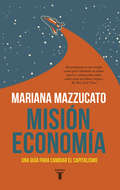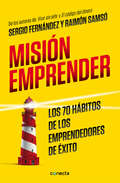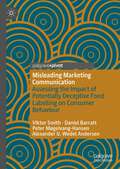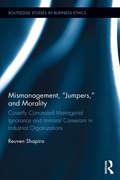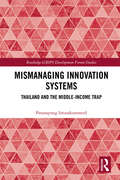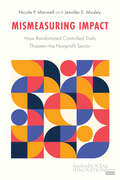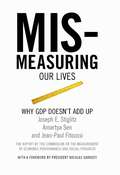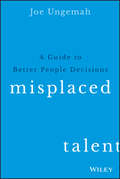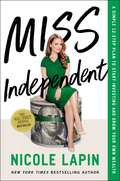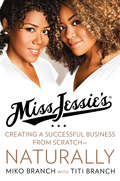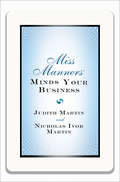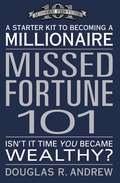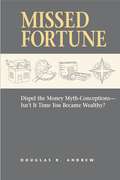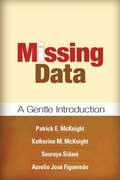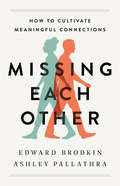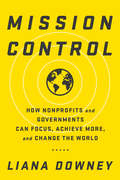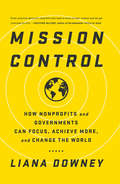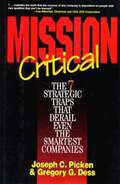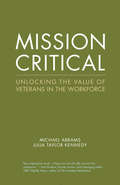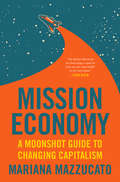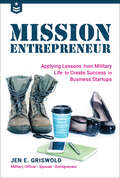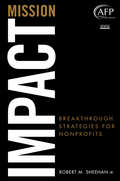- Table View
- List View
Misión economía: Una guía para cambiar el capitalismo
by Mariana Mazzucato¿Y si aplicáramos a nuestros problemas actuales el espíritu, la audacia y los medios que nos llevaron a la Luna? Una crítica contundente y muy necesaria del capitalismo moderno en la que la galardonada economista internacional sostiene que, para resolver las crisis a las que nos enfrentamos, debemos ser innovadores. Llegar a la Luna fue un extraordinario logro que requirió nuevas formas de colaboración entre los sectores público y privado, un altísimo nivel de compromiso y coordinación y la aceptación de riesgos y gastos muy elevados para alcanzar una meta a largo plazo. Inspirándose en las misiones del programa lunar, Mazzucato propone que se aplique ese mismo nivel de innovación a una serie de objetivos sociales, económicos y políticos clave con el fin de salir de nuestro estancamiento rumbo a un futuro más optimista. El capitalismo lleva tiempo paralizado y no ofrece respuestas a nuestros mayores problemas, como las epidemias, la desigualdad y la crisis ambiental. Se impone la necesidad de repensar el papel de los Estados en la economía y la sociedad, de orientar los presupuestos al largo plazo y de recuperar el sentido del interés público. Misión economía, cuyas ideas ya se están adoptando en todo el mundo, propone fijarse unos objetivos inspiradores e ilusionantes, entre los que se incluyen una prosperidad ampliamente compartida, unos servicios públicos de calidad para todos y una solución a la crisis climática. Según Mazzucato, los Estados pueden afrontar grandes desafíos y misiones ambiciosas, y su visión ofrece una salida a nuestro inmovilismo hacia un futuro más optimista. La crítica ha dicho...«Su propuesta es tan amplia como poco habitual: un nuevo relato convincente sobre cómo crear un futuro deseable.»The New York Times «Su defensa de un nuevo enfoque es abrumadora. Nos contagia con el tipo devisión, ambición e imaginación que tan desesperadamente necesitamos hoy.»The Guardian «Una visión oportuna y optimista. Aunque presenta sus argumentos de manera tan clara que pueden parecer obvios, lo cierto es que son revolucionarios.»Nature «Mazzucato sostiene que las sociedades deben abjurar de ideologías agotadas y adoptar el enfoque político que llevó a los astronautas en la Luna. Convincente y fascinante.»The Economist «Mazzucato critica la pobreza de la idea de que el único papel del gobierno es corregir las "fallas del mercado". Aboga por un sector público capaz de adaptarse a circunstancias cambiantes y nuevos desafíos.»Prospect «Mazzucato propone rediseñar el capitalismo a favor de las partes interesadas más que de los accionistas.»The Times «Desde 1969 nos preguntamos cómo los humanos pudieron llegar a la Luna y no logran resolver los problemas apremiantes aquí en la Tierra. Mariana Mazzucato ofrece la respuesta.»Financial Times «Una de las más ágiles pensadoras post-Brexit.»The Daily Mail «Según Mazzucato, años de privatizar empresas estatales y subcontratar servicios esenciales han dejado a los gobiernos debilitados e incapaces de beneficiar a la sociedad. Es el momento de que respalden objetivos audaces.»Reuters
Misión emprender: Los 70 hábitos de los emprendedores de éxito
by Raimon Samsó Sergio FernándezSergio Fernández y Raimon Samsó reúnen en este libro los 70 hábitos que nos convertirán en emprendedores de éxito y demuestran que ello depende más de la actitud, la mentalidad y, sobre todo, de los hábitos, que de los conocimientos adquiridos en cualquier universidad. Un libro para los héroes del siglo XXI: los emprendedores. El mercado laboral vive una verdadera revolución. Los empleos estables están desapareciendo y esto nos obliga a reinventarnos y a adaptarnos. En este contexto, cada vez más personas optan por emprender. Sin embargo, con frecuencia lo hacen sin la actitud, el conocimiento y el compromiso necesarios. El resultado es bien conocido: alrededor del 85% de los proyectos emprendedores fracasan antes de los cinco años, algo que podría evitarse con la preparación adecuada. Emprender no es un objetivo en sí mismo, una forma de ganar dinero o una salida laboral; emprender es una misión que dota de sentido a la vida, una manera de ofrecer nuestro valor a otros seres humanos y una transformación personal de gran calado: tu proyecto no crecerá más de lo que tú crezcas como persona. Los emprendedores de éxito son la humanidad del futuro. Personas hechas a sí mismas, en constante formación, motivadas, exigentes consigo mismas, apasionadas, educadas e instruidas, tolerantes, capaces de liderar, serviciales y colaboradoras, que aman lo que hacen y que se nutren espiritualmente. Este libro nos permitirá convertirnos en emprendedores de éxito de forma automática, simplemente incorporando los 70 hábitos imprescindibles para conducir nuestra vida al siguiente nivel tanto en el terreno personal como en el profesional. Una vez activados estos hábitos, el éxito será inevitable. Recuerda, tu misión: emprender.
Misleading Experiences: How to Spot This Common Cause of Flawed Decisions
by Sydney Finkelstein Jo Whitehead Andrew CampbellComplex decisions involving interpretation and judgment are difficult to get right. Especially considering the fact that our brains have developed decision making processes that rely heavily on our past experience. Misleading experiences are a common source of error in decision making that occur when the brain erroneously connects memories that seem similar to the situation we are currently assessing. But how do we know when an experience is misleading? In this chapter, the authors describe how to spot a misleading experience in advance and position yourself to strengthen the decision process, reducing the likelihood of making a bad decision. This chapter was originally published as chapter 5 of "Think Again: Why Good Leaders Make Bad Decisions and How to Keep It From Happening to You."
Misleading Marketing Communication: Assessing the Impact of Potentially Deceptive Food Labelling on Consumer Behaviour
by Viktor Smith Peter Møgelvang-Hansen Daniel Barratt Alexander U. Wedel AndersenUsing the case of food labelling, this book demonstrates that the line between fair and potentially misleading communication can be approached in empirical terms, supplementing the predominantly political and legal deliberations that determine how society deals with these issues. By first critically reviewing the legal conception of misleading commercial practices manifest in EU law, the authors discuss whether and how it can be transposed into empirically measurable terms. Presenting four complementary experimental studies targeting recurrent grey-zone scenarios on the Danish food market, the book illustrates the potential of the so-called ShopTrip test paradigm which simulates and registers real-life e-shopping behaviour as it unfolds while yielding new types of data against which opposing assessments of potential misleadingness can be matched. The results are discussed in the light of possible paths of theoretical explanation and implications for future regulative practices, including companies’ self-regulation.
Misleading Prejudgments: How to Spot This Common Cause of Flawed Decisions
by Sydney Finkelstein Jo Whitehead Andrew CampbellPrejudgments influence decisions because of the way we tag our thoughts with emotions. In decision making, it is the emotional tags that help us sort through the many possible interpretations we could make of a given situation and the many possible courses of action we could take. If the new situation is different from previous situations, prejudgments can inappropriately anchor our thinking, disrupt our objectivity, and make it hard for us to think things through afresh when circumstances change. Spotting prejudgments is critical to preventing flawed decision making, and in this chapter, the authors show you how to identify situations in which prejudgments might interfere with your assessment capabilities. This chapter was originally published as chapter 6 of "Think Again: Why Good Leaders Make Bad Decisions and How to Keep It From Happening to You."
Mismanagement, “Jumpers,” and Morality: Covertly Concealed Managerial Ignorance and Immoral Careerism in Industrial Organizations (Routledge Studies in Business Ethics)
by Reuven ShapiraExecutives’ morality and ethics became major research topics following recent business scandals, but the research missed a major explanation of executives’ immorality: career advancement by "jumping" between firms that causes ignorance of job-pertinent tacit local knowledge, tempting "jumpers" to covertly conceal this ignorance. Generating distrust and ignorance cycles and mismanagement, this choice bars performance-based career advancement and encourages immoral careerism, advancing by immoral subterfuges. Such careerism is a known managerial malady, but explaining its emergence proved challenging as managerial ignorance is covertly concealed as a dark secret on organizations’ dark side by conspiracies of silence. Managerially educated and experienced, Dr. Shapira achieved a breakthrough by a 5-year semi-native anthropological study of five "jumper"-managed automatic processing plants and their parent firms. This book untangles common ignorance and immoral careerism, concealed as dark secrets by executives who "rode" on the successes of mid-level "jumpers" who high-morally risked their authority and power by admitting ignorance and trustfully learned local tacit knowledge. The opposite choice tendencies accorded power, authority, and status rankings, which made practicing immorality easier the higher one’s position, suggesting that the common "jumping" between managerial careers nurtures immoral executives similar to those exposed in the recent business scandals.
Mismanaging Innovation Systems: Thailand and the Middle-income Trap (Routledge-GRIPS Development Forum Studies)
by Patarapong IntarakumnerdOnce recognised as a high-performing newly industrialising Asian economy with the potential for economic and developmental success similar to South Korea, Taiwan, Hong Kong and Singapore, Thailand’s growth rate and competitive edge have declined substantially. With slower adoption and movement towards the knowledge-intensive industries, the loss of the competitive edge is a cause of growing concern among Thai policymakers, with Thailand succumbing to the middle-income trap. This book analyses Thailand’s declining competitiveness in the past 50 years, considering both the national and sectoral roles and capabilities of key players, including the government, universities and research institutes, as well as the electronics, food, and automotive industries. Including comparative analyses with other Asian nations, this book is a must-read for both students and practitioners with interests in development economics, industrial economics and public policy.
Mismeasuring Impact: How Randomized Controlled Trials Threaten the Nonprofit Sector (Stanford Social Innovation Review Books)
by Nicole Marwell Jennifer MosleyThe hidden dangers of randomized controlled trials The need to demonstrate the effectiveness of nonprofit social programs has led to a rapid rise in the use of randomized controlled trials (RCTs), for evaluation. As a result, most nonprofit sector professionals can tell you why nonprofits should do an RCT. This book tells you why they probably shouldn't, and what to do instead. Mismeasuring Impact explores why RCTs are being embraced as the "gold standard" for nonprofit evaluation, despite the high cost and time investment required and the serious problems with using RCTs in a nonprofit context. (Most RCTs conducted in nonprofits fail to meet required standards for rigor, undercutting their accuracy). The book describes what happens inside nonprofits when they take part in RCTs, the unintended equity issues that arise, and why nonprofits feel pressured participate in RCTs despite the problems. University of Chicago professors Marwell and Mosley's research is based on extensive interviews with key players: nonprofit managers, professional program evaluators, and program officers in philanthropic foundations. The book argues that, ultimately, RCTs are used to poorly ground nonprofit legitimacy, not to foster nonprofit improvement. RCTs also privilege program and organizational standardization over the key strengths of nonprofit organizations: flexible innovation and responsiveness to community needs. Nonprofits and funders need forms of evaluation that lift up these strengths. Mismeasuring Impact offers alternative approaches that build strong organizations, not just cookie-cutter programs, and which funders and nonprofits of all sizes can support.
Mismeasuring Our Lives
by Amartya Sen Joseph E. Stiglitz Jean-Paul FitoussiIn February of 2008, amid the looming global financial crisis, President Nicolas Sarkozy of France asked Nobel Prize-winning economists Joseph Stiglitz and Amartya Sen, along with the distinguished French economist Jean Paul Fitoussi, to establish a commission of leading economists to study whether Gross Domestic Product (GDP)-the most widely used measure of economic activity-is a reliable indicator of economic and social progress. The Commission was given the further task of laying out an agenda for developing better measures.Mismeasuring Our Lives is the result of this major intellectual effort, one with pressing relevance for anyone engaged in assessing how and whether our economy is serving the needs of our society. The authors offer a sweeping assessment of the limits of GDP as a measurement of the well-being of societies-considering, for example, how GDP overlooks economic inequality (with the result that most people can be worse off even though average income is increasing); and does not factor environmental impacts into economic decisions.In place of GDP, Mismeasuring Our Lives introduces a bold new array of concepts, from sustainable measures of economic welfare, to measures of savings and wealth, to a "green GDP." At a time when policymakers worldwide are grappling with unprecedented global financial and environmental issues, here is an essential guide to measuring the things that matter.
Misplaced Talent
by Joe UngemahHigh-value talent management must be relevant to today's workplace Misplaced Talent takes a hard look at the cluttered field of Talent Management, and offers a clear guide to making better people decisions in any organization. Deliberately challenging practitioners to do more, this insightful discussion sorts through the tools and techniques developed over the last century to examine their true relevance to the modern workplace. You'll learn which activities show the greatest potential to improve the lives of employees and the organizations they work for, and identify which of your existing practices don't really add enough value to be worth the expenditure of time, money, and potentially lost talent. The author asks you to make up your own mind about which approaches work best for your own specific talent decisions, but provides the best theory and practice available today as a foundation upon which to formulate a more relevant strategy. In a world of big data, the potential to understand employees and react appropriately has never been greater. So why is Talent Management as an industry relying on outdated theory and practices? This book is a guide to bringing HR up to date, giving you the tools, techniques, and perspective you need to demonstrate more value to your organization. Adopt the tools and techniques most effective in today's workplace Identify and discard methods that don't add value to the organization Implement critical changes that can transform the HR function Make better people decisions based on psychology and research Fundamentally, not much has changed in what constitutes good people practice. Practitioners must demonstrate the value of Talent Management, but the solutions implemented often fall short of the rigor and discipline they deserve. Misplaced Talent provides the insight you need to refocus attention and engage your organization about the value of better people decisions.
Miss Independent: A Simple 12-Step Plan to Start Investing and Grow Your Own Wealth
by Nicole LapinNew York Times bestselling author of Rich Bitch and renowned money expert Nicole Lapin makes investing accessible and fun so women can make bank and become Miss Independent.You&’ve worked hard for your money and now it&’s time for your money to work for you. You will never earn or budget your way into real wealth. Growing your money significantly doesn&’t require starting with a lot of money. It requires a little bit of knowledge about taking smart risks and as much time as possible to take advantage of the glorious power of compound interest, which Einstein refers to as the eighth wonder of the world.From automating your savings to easy, no-stress investing strategies, Nicole will teach you how to take your financial knowledge and portfolio to the next level and start you on your journey to your ultimate destination: true financial independence.In Miss Independent, you will learn:The freedom that wealth affords you, whether it&’s the ability to leave a crappy job or significant other, go on the vacation of your dreams or otherwise live life on your own terms. The best method for establishing your &“number&”—the amount of wealth you want to accumulate before you retire—and getting it.The meaning of the most common investing terms, like stocks and bonds, (and some more exotic ones like REITs or cryptocurrency) and how to make them work to your advantage.The ins and outs of big financial decisions and concepts, like taking out a mortgage, owning investment properties, and buying life insurance.Miss Independent takes the fear out of money management and investing once and for all. Using her own vulnerable stories and her signature conversational style, let Nicole show you all the different ways and paths that you can take to become financially free at last.
Miss Jessie's
by Miko BranchMiss Jessie's is a memoir and business guide rich with inspirational life lessons and unique business advice from Miko Branch, the Chief Executive Officer of the dynamic Miss Jessie's--the company that revolutionized the hair-care industry.When Miko and her sister, Titi, were children, their grandmother Miss Jessie taught them independence and showed them the value of being "do it yourself" women, all while whipping up homemade hair concoctions at her kitchen table. As a co-founder of Miss Jessie's, Miko reveals how she and Titi applied their grandmother's lessons to create a successful business from scratch. Miss Jessie's chronicles the Branch sisters' remarkable story. When they were children, their stern father encouraged them to become self-reliant and not to depend on their looks to get ahead. Taking this message to heart, they blossomed into business owners and leaders in their field, using ingenuity and without borrowing a dime. They soaked up the entrepreneurial and creative culture of the early hip-hop era on the streets of Brooklyn in the late 1990s, and in the high-end salons of Manhattan. They blended these inspirations to establish a business that has gone from their kitchen table to the shelves of major retailers around the globe, revolutionizing the hair-care industry. A charming and enlightening look at the women behind the brand, Miss Jessie's is chock-full of entertaining stories and invaluable instruction that can be applied to any business: an authentic expression that the American Dream is possible.
Miss Manners Minds Your Business
by Judith Martin Nicholas Ivor Martin"Both a sad and hilarious commentary on the state of the modern workplace."--New York Times What do your colleagues, overlords, underlings, clients, and customers have in common? Not knowing how much they annoy you. Not to mention how much you may be annoying them. The route from cubicle to corner office is strewn with etiquette landmines. And now that the boundaries that once cleanly separated work from personal life are blurred, even polite people don't recognize the difference between professional and social manners. What do you say to a colleague who has just been fired? How do you maintain a family-friendly office without discriminating against singles? What's the difference between showing romantic interest and sexual harassment? Which colleagues should be invited to family weddings? When should you be unavailable, at or away from work? Don't convene a focus group or appeal to Human Resources--consult Miss Manners! With wit and wisdom, Miss Manners restores civility, guiding you around your coworker's messy cubicle, past your overly prying boss, around the bridal shower for the new temp, and through tedious staff meetings. In Miss Manners Minds Your Business, Judith Martin and her son, executive Nicholas Ivor Martin, equip readers with the practical, pertinent, and utterly correct advice necessary to win the job, keep the job, and leave the job with sanity and dignity intact.
Missed Fortune 101: A Starter Kit to Becoming a Millionaire
by Douglas R. AndrewTrue or False? * Always prepay your mortgage. * The right 401(k) or IRA will completely cover your retirement. * Defer your taxes and postpone the pain. * True wealth doesn't last forever. They're All False! MISSED FORTUNE 101 ...is like no other money guide you've ever read. Its author, successful financial strategist Douglas R. Andrew, dares to question the conventional wisdom on personal finance that most people accept. He reveals the ways banks, credit unions, and insurance companies amass tremendous wealth-what they do, and what they don't do. He shows you how to seize financial opportunities you never knew existed. With MISSED FORTUNE 101 as your guide, you'll never view your house, your mortgage, your retirement plans, your investments, and your other assets the same way again. * Put the lazy, idle dollars trapped in your home to work safely-and reap as much as an extra million. * Discover hidden and perfectly legal tax breaks-and treat yourself to some surprising windfalls. * Play the bankers' favorite game-borrow at one rate and invest at a higher one. * Explore lesser-known retirement vehicles-and avoid falling into a higher tax bracket when you stop working. * Turn your life insurance policy into an investment-and keep your taxes down and your capital up. * Find out which low-return instruments should be in your portfolio today-and why they'll become high-return stars tomorrow. * Reach your "freedom point"-your financial independence-long before "retirement age"! Learn the real rules of smart investing. Maximize your wealth with MISSED FORTUNE 101.
Missed Fortune: Dispel the Money Myth-Conceptions--Isn't It Time You Became Wealthy?
by Douglas R. AndrewMost of us dream of becoming wealthy. While some take steps to achieve it, few realize the goal. Why? According to financial planner Douglas R. Andrew, flawed financial strategis - or what he calls "money myth-conceptions" - lead us down the wrong road. In his revolutionary financial guide, MISSED FORTUNE: Dispel the Money-Myth Conceptions - Isn't it Time You Became Wealthy? , Andrew rattles conventional attitudes about personal investments and challenges readers to build wealth with new and - and very contrarian - strategies.
Missing Data
by Patrick Mcknight Katherine McknightWhile most books on missing data focus on applying sophisticated statistical techniques to deal with the problem after it has occurred, this volume provides a methodology for the control and prevention of missing data. In clear, nontechnical language, the authors help the reader understand the different types of missing data and their implications for the reliability, validity, and generalizability of a study's conclusions. They provide practical recommendations for designing studies that decrease the likelihood of missing data, and for addressing this important issue when reporting study results. When statistical remedies are needed--such as deletion procedures, augmentation methods, and single imputation and multiple imputation procedures--the book also explains how to make sound decisions about their use. Patrick E. McKnight's website offers a periodically updated annotated bibliography on missing data and links to other Web resources that address missing data.
Missing Each Other: How to Cultivate Meaningful Connections
by Edward Brodkin Ashley PallathraThe ability to connect with another person and truly be in tune with their physical and emotional state is one of the most elusive interpersonal skills to develop. This book shows you how.In our fast-paced, tech-obsessed lives, rarely do we pay genuine, close attention to one another. With all that&’s going on in the world and the never-ending demands of our daily lives, most of us are too stressed and preoccupied to be able to really listen to each other. Often, we misunderstand or talk past each other. Many of us are left wishing that the people in our lives could really listen, understand, and genuinely connect with us.Based on cutting-edge neuroscience research and years of clinical work, psychiatrist Edward Brodkin and therapist Ashley Pallathra take us on a wide-ranging and surprising journey through fields as diverse as social neuroscience and autism research, music performance, pro basketball, and tai chi. They use these stories to introduce the four pillars of human connection: Relaxed Awareness, Listening, Understanding, and Mutual Responsiveness. Accessible and engaging, Missing Each Other explains the science, research, and biology underlying these pillars of human connection and provides exercises through which readers can improve their own skills and abilities in each.
Mission Control: How Nonprofits and Governments Can Focus, Achieve More, and Change the World
by Liana DowneyIn the last ten years the number of nonprofits and social sector organizations has grown by almost 25 percent, while charitable giving declined 30 percent over the same period. As a result, many organizations are chasing grants, tweaking and adding to their core activities to match what they think funders are looking for. Almost half of nonprofits surveyed nationally in 2014 said they added additional programs in the last year. The result is colloquially known as "mission creep"--organizations trying to be everything to everyone. Yet research suggests that the more goals individuals or organizations pursue, the less likely they are to achieve them, leaving these organizations often overwhelmed, underfunded, and unfulfilled. Mission Control: How Nonprofits and Governments Can Focus, Achieve More, and Change the World is designed to restore focus and gain "mission control" to identify the things they should and should not do to drive impact. Drawing from the author's experience of working with thousands of clients at nonprofits and government agencies around the world, both large and small, the book represents the stories of countless mission-driven organizations. Downey helps leaders, teams, executive directors, and boards with the critical task of clarifying an organization's sweet spot at the intersection of what it is good at, what its clients need, and the activities that get measurable and sustainable results.
Mission Control: How Nonprofits and Governments Can Focus, Achieve More, and Change the World
by Liana DowneyIn the last ten years the number of nonprofits and social sector organizations has grown by almost 25 percent, while charitable giving declined 30 percent over the same period. As a result, many organizations are chasing grants, tweaking and adding to their core activities to match what they think funders are looking for. Almost half of nonprofits surveyed nationally in 2014 said they added additional programs in the last year. The result is colloquially known as "mission creep"-- organizations trying to be everything to everyone. Yet research suggests that the more goals individuals or organizations pursue, the less likely they are to achieve them, leaving these organizations often overwhelmed, underfunded, and unfulfilled. Mission Control: How Nonprofits and Governments Can Focus, Achieve More, and Change the World is designed to restore focus and gain "mission control" to identify the things they should and should not do to drive impact. Drawing from the author's experience of working with thousands of clients at nonprofits and government agencies around the world, both large and small, the book represents the stories of countless mission-driven organizations. Downey helps leaders, teams, executive directors, and boards with the critical task of clarifying an organization's sweet spot at the intersection of what it is good at, what its clients need, and the activities that get measurable and sustainable results.
Mission Critical: The 7 Strategic Traps That Derail Even the Smartest Companies
by Joseph C. Picken Gregory G. DessIs there a common thread in strategic failure? Learn how to avoid the common traps and create a sound strategy implemented without error.
Mission Critical: Unlocking the Value of Veterans in the Workforce (Center for Talent Innovation)
by Michael Abrams Julia Taylor Kennedy<p>The Center for Talent Innovation's new study, <i>Mission Critical: Unlocking the Value of Veterans in the Workforce</i>, reveals how companies can ensure their veteran talent thrives in the corporate world. Veterans represent a highly desirable talent pool when they transition to civilian careers. They retain the passion for service and camaraderie that drew them into the military, and they bring leadership and technical skills honed in a pressure cooker. In recent years, corporate employers have demonstrated they understand the potential of this valuable cohort by greatly increasing their recruitment efforts. Yet once veterans get through the doors of corporations, they languish. In a matter of months, many ambitious, skilled veterans lose their drive, failing to fulfill their leadership potential—more than half say they don't aspire to hold a more senior position. Many of the remainder feel stalled in their careers. <p>Why? First, leaders don’t understand their potential. Second, veterans feel distant from their teams and cover their veteran identity in an effort to get closer. Third, they hunger for meaning and purpose at work, something they found in the military but lack in civilian jobs. <i>Mission Critical</i> explores these factors in-depth, especially as they affect women and veterans of color.</p>
Mission Economy: A Moonshot Guide to Changing Capitalism (Boston Review / Forum Ser.)
by Mariana Mazzucato“She offers something both broad and scarce: a compelling new story about how to create a desirable future.”—New York Times An award-winning author and leading international economist delivers a hard-hitting and much needed critique of modern capitalism in which she argues that, to solve the massive crises facing us, we must be innovative—we must use collaborative, mission-oriented thinking while also bringing a stakeholder view of public private partnerships which means not only taking risks together but also sharing the rewards. Capitalism is in crisis. The rich have gotten richer—the 1 percent, those with more than $1 million, own 44 percent of the world's wealth—while climate change is transforming—and in some cases wiping out—life on the planet. We are plagued by crises threatening our lives, and this situation is unsustainable. But how do we fix these problems decades in the making? Mission Economy looks at the grand challenges facing us in a radically new way. Global warming, pollution, dementia, obesity, gun violence, mobility—these environmental, health, and social dilemmas are huge, complex, and have no simple solutions. Mariana Mazzucato argues we need to think bigger and mobilize our resources in a way that is as bold as inspirational as the moon landing—this time to the most ‘wicked’ social problems of our time.. We can only begin to find answers if we fundamentally restructure capitalism to make it inclusive, sustainable, and driven by innovation that tackles concrete problems from the digital divide, to health pandemics, to our polluted cities. That means changing government tools and culture, creating new markers of corporate governance, and ensuring that corporations, society, and the government coalesce to share a common goal.We did it to go to the moon. We can do it again to fix our problems and improve the lives of every one of us. We simply can no longer afford not to.
Mission Entrepreneur: Applying Lessons from Military Life to Create Success in Business Startups
by Jen E. GriswoldThe military veteran and entrepreneur teaches fellow military spouses how to deploy their unique skills in the field of startup businesses.Military spouses face some unique challenges when it comes to pursuing a career, often putting their ambitions on hold due to relocation. Ironically, these same people have the ideal skill set for achieving entrepreneurial success: work ethic, vision, passion, and resilience.In Mission Entrepreneur, veteran and military spouse Jen E. Griswold shares her personal story of transforming those skills into a successful business career. From her extensive training in the U.S. Air Force, Griswold learned the value of integrity and the importance of teamwork. After using these lessons to start multiple businesses that are able to be run from anywhere, she’s giving back to her military community by sharing what she learned.
Mission Impact
by Robert M. Sheehan Jr.Create powerful strategies for your nonprofit organization to achieve breakthrough performance in mission impactDoes your nonprofit have a reliable way of knowing the impact its making? Beginning with an eye-opening discussion of what strategy is, Mission Impact: A Breakthrough Strategy for Nonprofits reveals how the process of strategy development should be designed with authoritative coverage of mission impact, vision, five year strategic stretch goals, strategy implementation, and management.Step-by-step guidance and practical toolsIntegrates the very best current thinking on performance and strategy available, drawing from both the corporate and nonprofit worldsCutting-edge ideas presented in a user-friendly fashionThe deteriorating quality of life in our communities screams out for immediate action - for breakthrough improvement, not just incremental changes. Mission Impact: A Breakthrough Strategy for Nonprofits will lead you and your organization to achieve breakthrough performance for maximum mission impact.Note: CD-ROM/DVD and other supplementary materials are not included as part of eBook file.
Mission Impossible? Yummy77 Delivers Groceries within the Hour
by Benjamin EdelmanYummy77 considers alternative operational models to reduce cost, improve speed, and increase appeal. Can one of these approaches succeed where others have failed?
